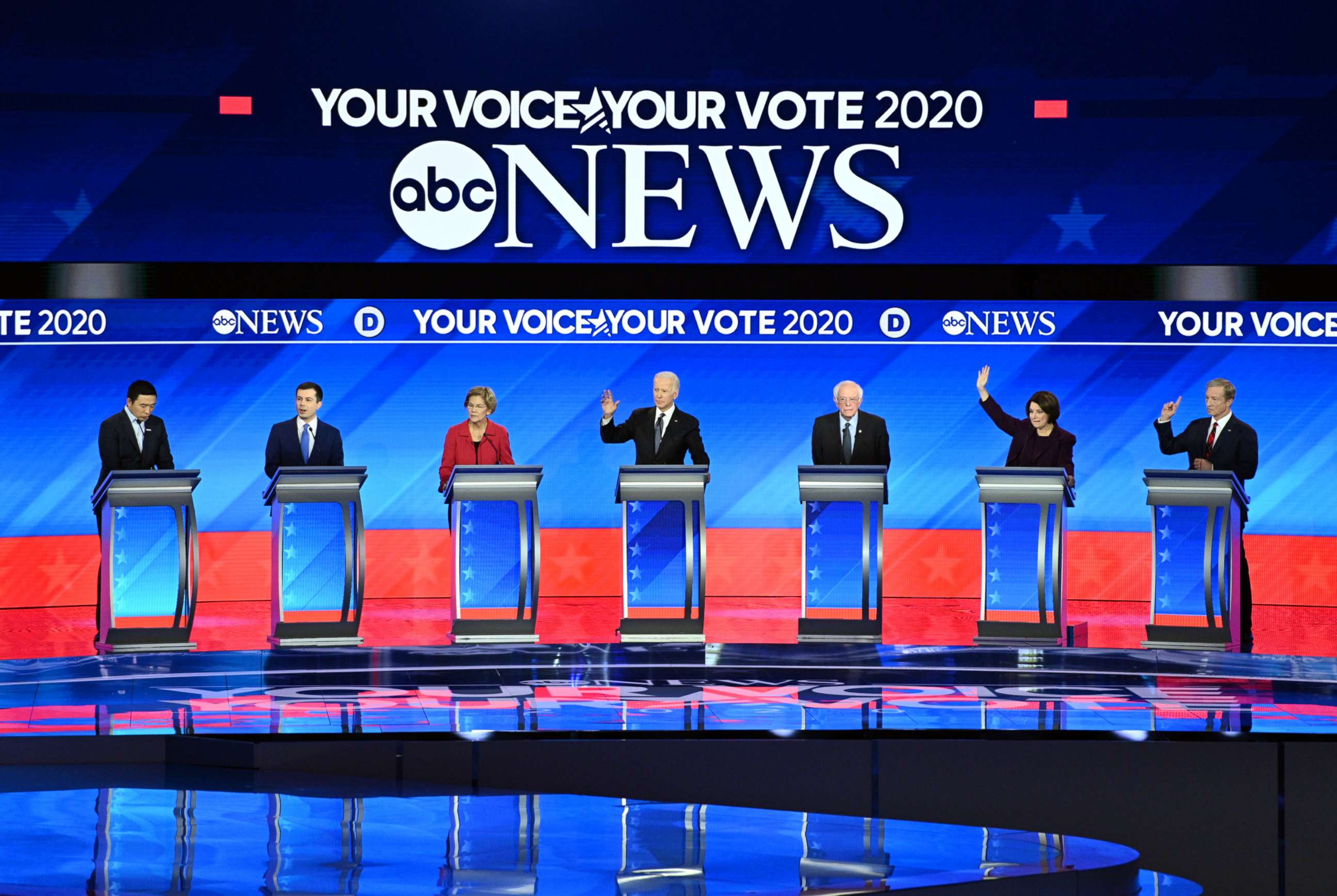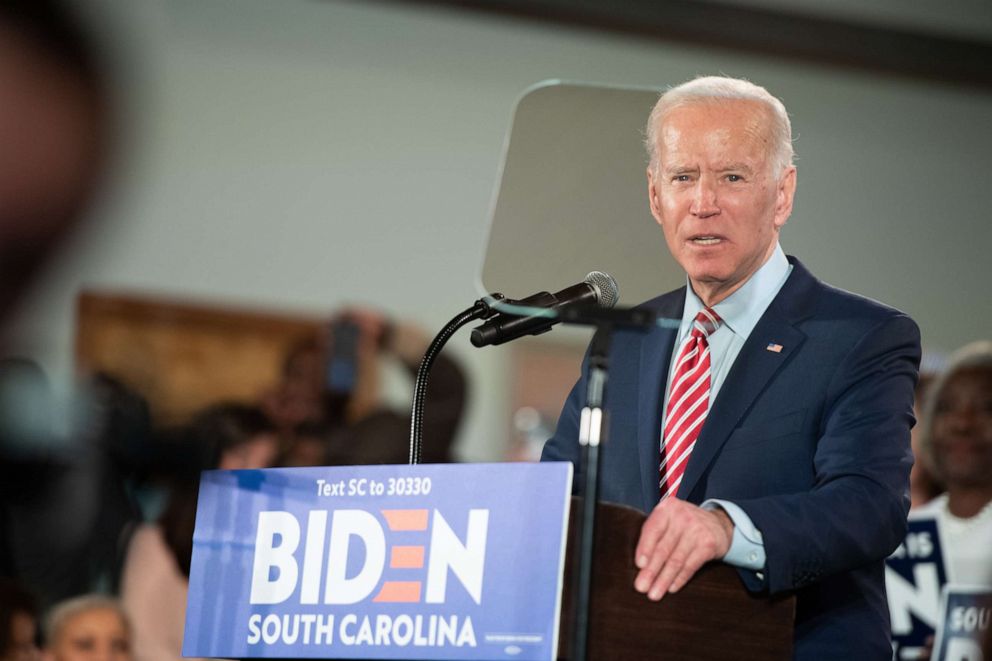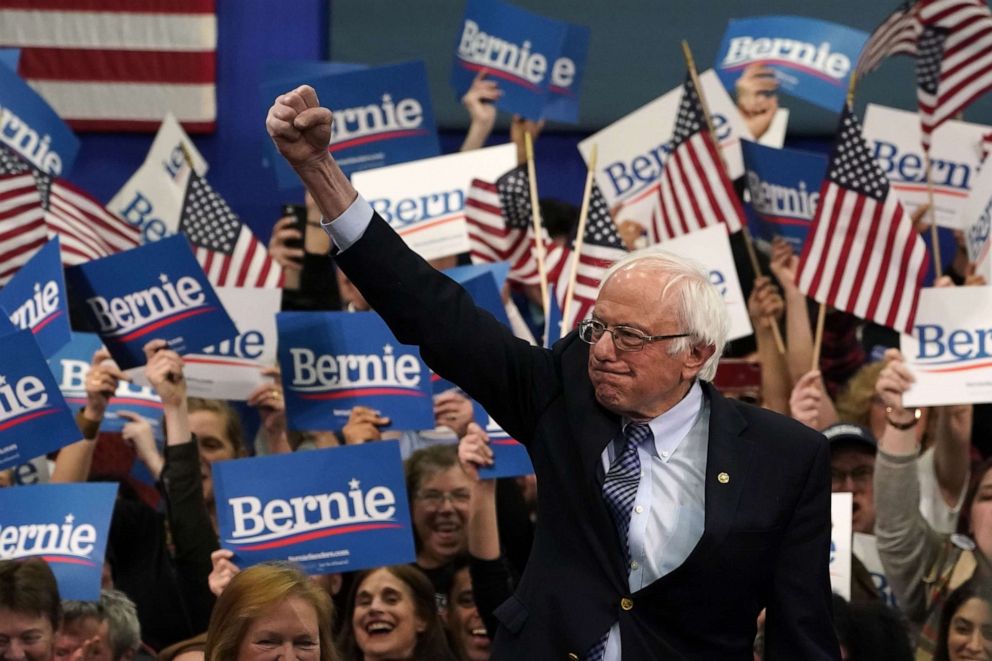The Note: Slog of a race confronts Democrats as delegate realities sink in
Don’t look for the next two states to provide decisive victories for anyone.
The TAKE with Rick Klein
There were winners and losers in both Iowa and New Hampshire, and similar results will roll in from Nevada and South Carolina before the race goes national.
But you can come up with different front-runners -- or no front-runner at all -- by viewing the race through the prism of votes, potential coalitions or pure expectations.
The most relevant metric also happens to be the most brutal: delegates. Cast that way, the race from here is less about the possibility of soaring victories than it is a slog to 1,991 -- or a few hundred more, in the event of a contested convention -- given the near-certainty of several candidates amassing delegates in every state.

That's how campaigns are planning the race from here. Five candidates have already won delegates and the two billionaires in the contest are well-positioned to put points on the board soon.
Getting 15% of the vote is hard, but having candidates win states without hitting 30% makes it hard for others not to. Between organized labor’s skepticism of “Medicare for all” in Nevada and the fight for African American votes in South Carolina, don’t look for the next two states to provide decisive victories for anyone.
And with Sen. Elizabeth Warren retrenching to Super Tuesday, where former Mayor Michael Bloomberg’s advertisements have boosted his profile early, big voting days could prove messy.
Sen. Bernie Sanders now sits atop FiveThirtyEight’s forecast of which candidate is likeliest to win more than half of the pledged delegates. In second place in the forecast, in the wake of New Hampshire: “No one.”
The RUNDOWN with MaryAlice Parks
A prolonged primary isn't necessarily a problem for a party. Republicans were nervous when theirs got nasty in 2016, but so far in 2020, Democrats have still been mostly playing nice.
Sure there have been more direct attacks as of late. But in the grand scheme of politics they have been mild and mostly from surrogates and not the candidates themselves.
Rep. Cedric Richmond stumped for Joe Biden in South Carolina, and -- trying to brush aside the former vice president's recent poor performances -- told the crowd that the other candidates were still too much of a risk.
“When we get to the general election, we cannot afford to take a chance with a self-defined socialist, a mayor of a very small city, a billionaire who all of the sudden is a Democrat,” he said referring to Sanders, former Mayor Pete Buttigieg and Bloomberg, in that order.
Earlier in the day, Sanders himself said Bloomberg's self-funded -- and spectacularly funded -- campaign was evidence of why the country needed to end the spending allowed under the landmark Citizens United decision.

Buttigieg too went on the offense against Sanders’ health care policy proposals.
There will be a lot of angst about the need to come together and work together as a party in the coming weeks and months as the primary drags on, and so all of the little slights will be scrutinized. But if past is prologue don't expect the race to get personal overnight. Voters, so far, have not rewarded candidates who even flirt with going negative.
The TIP with Kendall Karson
Bernie Sanders in 2016 was a classic underdog, a far cry from Bernie Sanders in 2020, who now holds the status of Democratic front-runner. When the insurgent, self-described "Democratic socialist" set foot in this cycle's Democratic primary as one of the most formidable contenders in the race, he was also no longer the sole, catch-all alternative to the establishment.
In a far more competitive and deep field, Sanders still emerged from the New Hampshire primary the clear winner, with a record 300,622 voters overwhelming the Democratic polls, according to the secretary of state. But unlike four years ago when he scored a decisive win over Hillary Clinton, Sanders only narrowly won this time around, leaning heavily on his core base.

Even with Buttigieg and Sen. Amy Klobuchar nipping at his heels, the 20 towns and cities where Sanders performed best Tuesday night reflected the same regions that delivered some of his widest margins over Clinton in 2016. He ran up the score in the Acworth, Keene and Unity, among others, in the southwest region, which shares a border with Vermont -- his home state -- and in Dorchester, Benton and Stratford, which sit in rural north country.
Sanders' grip on his base is still intact four years later, but in a different race, he'll now likely face even more scrutiny about his ability to expand on it to take on President Donald Trump.
THE PLAYLIST
ABC News' "Start Here" Podcast. Thursday morning's episode features ABC News Foreign correspondent James Longman, who calls in from the front lines in Syria where U.S. troops were fired on Wednesday. Then, ABC News' Alexander Mallin has more fallout from the Justice Department's involvement in the Roger Stone case. http://apple.co/2HPocUL
ABC News' "Powerhouse Politics" podcast. Former Vice President Joe Biden didn't stick around in New Hampshire to see how far he fell in the final votes. A clean New Hampshire win by Sen. Bernie Sanders provides little clarity in the race. Former Mayor Pete Buttigieg comes out of the first two states with two more delegates than Sanders, and Sen. Amy Klobuchar's surprise finish puts her in renewed contention, too. Guest: Lis Smith, senior adviser for Buttigieg 2020 campaign. https://apple.co/23r5y7w
WHAT YOU NEED TO KNOW TODAY
Download the ABC News app and select "The Note" as an item of interest to receive the day's sharpest political analysis.
The Note is a daily ABC News feature that highlights the key political moments of the day ahead. Please check back tomorrow for the latest.




